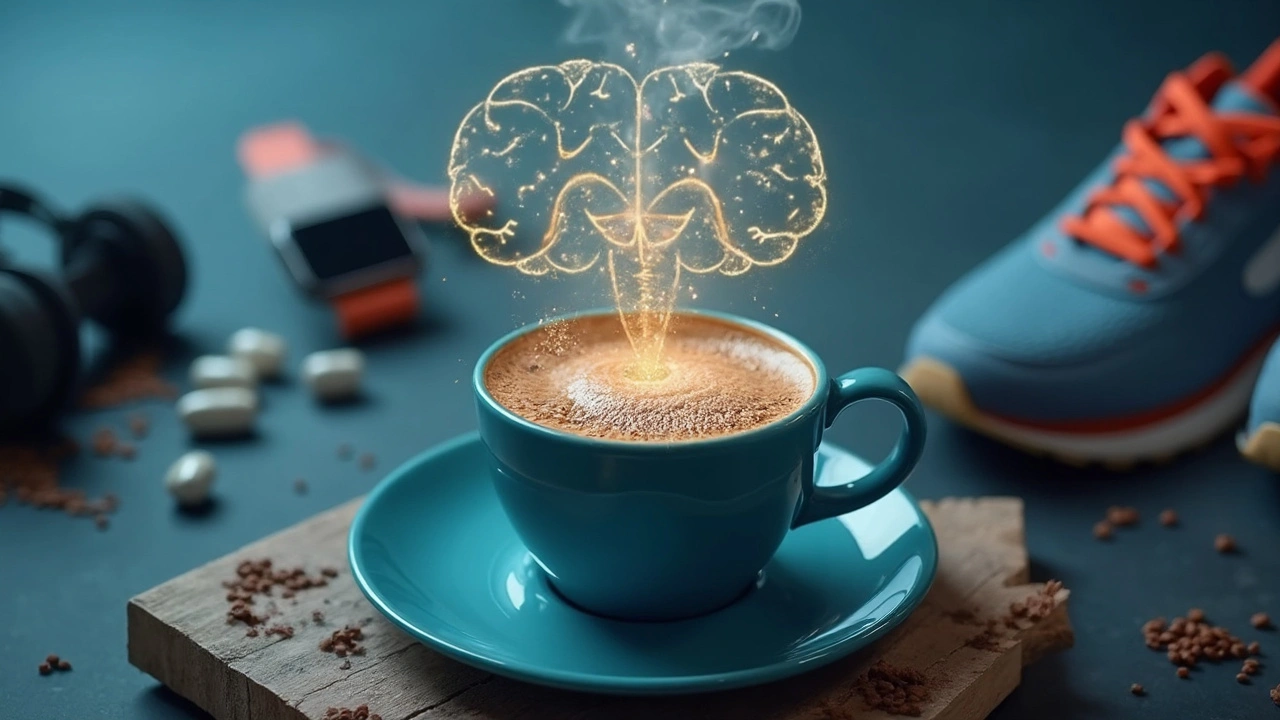Unlocking Coffee’s Health Benefits: Surprising Perks of This Powerful Dietary Supplement
 Jun, 15 2025
Jun, 15 2025
Step into any café at 8 a.m., and you’ll see it—the sleepy shuffle, the hopeful glint in people’s eyes, and the absolute reverence for that steaming brew we call coffee. But the story doesn’t stop at waking you up. Coffee has quietly worked its way into the world of supplements, and science keeps revealing its deeper health powers. A cup is more than caffeine. It’s a dietary supplement bursting with antioxidants, mood-boosters, and potential protectors against disease. If you’ve always seen coffee as your morning ritual, get ready. You might be missing out on a bunch of untapped benefits hiding in your mug.
The Science Behind Coffee’s Power as a Dietary Supplement
Coffee isn’t just a jolt for your nerves—there’s actual biochemistry working hard behind the scenes. Every cup is packed with more than 1,000 compounds, including a formidable lineup of antioxidants like chlorogenic acid, quinines, and trigonelline. For people keen on reducing inflammation or battling oxidative stress, these aren’t just fancy words. They’re little shields floating around in your blood, mopping up cellular damage before trouble starts. In fact, a study published in the Journal of Nutrition in 2023 confirmed that regular coffee drinkers, especially in America, get most of their daily antioxidants not from fruits or vegetables, but straight from their coffee.
Caffeine is the big star, and you know it. But coffee’s magic isn’t just from the caffeine kick. Those polyphenols I mentioned? They can help lower blood pressure and regulate blood sugar. Scientists in Italy even found daily coffee drinkers had a 20% reduced risk of type 2 diabetes. Not bad for something you can brew before you feed the cat. And let’s not forget about magnesium and potassium: tiny minerals that play roles in everything from hydration to muscle function. Coffee has both. Pretty wild for a drink with zero calories.
But you’ve probably heard people say, “But coffee dehydrates you!” Spoiler—it’s not true, at least not after your body gets used to it. Coffee’s modest diuretic effect fades for regular drinkers. No need to swap your trusty mug for a glass of water. Your kidneys are already onto the game.
Surprising Health Benefits Beyond the Buzz
Everyone knows about the alertness. That’s the obvious perk. But there’s plenty more happening with each sip. For starters, coffee can actually bring your mood up. Caffeine blocks adenosine, a compound in your brain that signals fatigue. The result? More dopamine, aka the “feel good” neurotransmitter. You know that slightly euphoric feeling after your first coffee? Thank your brain chemistry.
Coffee might have your heart’s back, too. Moderate coffee drinkers—think two to four cups a day—have shown a lower risk of developing heart disease. There’s also evidence coffee is linked to a lower chance of certain types of stroke, according to a big batch of research from South Korea in 2022. The researchers followed over 160,000 people and found that coffee fans got fewer strokes than folks who never touched the stuff. That’s not to say coffee’s a miracle drug, but it certainly steps up where you wouldn’t expect it.
Heads up to people worried about neurodegenerative diseases. Some of the most exciting coffee research in the last few years has dug into its link with brain health. Coffee drinkers have a lower risk of Parkinson’s and Alzheimer’s, possibly because caffeine helps maintain the connections between nerve cells. Some researchers even suggested that coffee’s unique mix of compounds, not just the caffeine alone, delivers this brain-boosting effect.
And I can’t skip the gut. Have you ever noticed your digestion is a bit...faster after coffee? There’s a reason for that. Coffee ramps up gastric motility, helping your body stay regular. Plus, those polyphenols support friendly gut bacteria, which is a big deal if you want a happy tummy. Just don’t go wild—too much can tip you over into the “why did I drink that third cup?” zone.

Getting the Most Out of Coffee as a Health Booster
If you want to squeeze out the best health effects, it matters how you prepare your coffee. Brewing style changes everything. A French press or espresso will leave you with more cafestol—a natural compound that can boost cholesterol. While paper-filtered coffee, like the classic drip-brew, removes most of that cafestol. So if cholesterol’s a concern, maybe swap out your metal filter for paper. Little choices make a real difference.
Dosing matters, too. The sweet spot seems to be about two to four cups daily for most people. That’s around 200 to 400 milligrams of caffeine. Beyond that, the energy boost can start to feel more like the jittery shakes. And while coffee doesn’t really “dehydrate” you, knocking back six or more cups a day could irritate your stomach or ramp up anxiety. Coffee’s all about balance. Listen to your body. Mine literally tells me when I’ve hit my quota. (And my cat Beeble, not a fan of my caffeine-fueled energy bursts.)
There’s another angle: try your coffee straight up, or with minimal extras. Loading it with sugar and heavy cream flips a health drink into dessert territory. That’s where antioxidants battle it out against extra calories, after all. If you want a bit of flavor, reach for a dash of cinnamon—it’s loaded with its own anti-inflammatory punch. Plus, cinnamon and coffee were made for each other, flavor-wise.
- If you’re watching your blood pressure, try limiting your intake to mornings only. Caffeine can spike your pressure temporarily but usually settles back down in regular users.
- People with sensitive stomachs? Cold brew is less acidic, so it’s easier on your digestive system. You can also add a splash of oat milk for extra creaminess and nutrients.
- Timing your cup matters. Avoid coffee at least six hours before bed, unless you enjoy staring at your ceiling at 2 a.m. counting sheep—and possibly plotting revenge against your barista.
And if you’re pregnant or taking certain meds, it’s smart to check with your doctor. Coffee can tweak how your body absorbs some medications, especially antidepressants or blood pressure drugs.
Coffee as a Support for Metabolism and Weight Management
Trying to speed up your metabolism or keep your weight in check? Coffee quietly chips in here, too. Caffeine is known for cranking up thermogenesis—basically how your body burns down calories to produce heat. That’s why you see caffeine in nearly every fat-burner supplement on shelves. Real-life studies back this up: people who have coffee before exercise tend to burn more calories both during and after their workouts. Even if you just take a brisk walk after your morning cup, you might be torching a little extra without any crazy effort.
Another fantastic thing about coffee is appetite control. If you ever noticed your hunger fading a bit post-coffee, you’re not imagining it. Caffeine temporarily suppresses appetite, especially for a couple of hours after you drink it. While this doesn’t turn coffee into a magic weight loss potion, it can help with mindful eating. Pair your cup with a protein-rich breakfast, and you’ll stay satisfied much longer.
A quick side note—your genes do play a role here. Some people process caffeine fast, others slow. If you get anxious, jittery, or have a racing heartbeat, you might be the slow type. No shame in dialing it back. Researchers in the UK identified variants in the CYP1A2 gene in 2021 that literally change how coffee affects you. Wild, right? We really aren’t one size fits all when it comes to coffee metabolism.
- If you’re keen on boosting workout performance, sip a cup about 30 minutes before exercise. That’s when you’ll get the best effect.
- Don’t rely on coffee to “skip meals”—that’s a spiral. Use it to add a bonus to a healthy diet, not as a replacement.
- Keep your routine steady. Bouncing up and down in coffee intake trains your body to adapt and can give you unpredictable energy swings. Your body really does like routine.
And don’t forget the mindset piece. For lots of folks, having a quiet moment with coffee before tackling a to-do list can lower stress and prompt a small moment of mindfulness. Who knew “self-care” could taste this good?

Tips for Making Coffee Part of Your Daily Health Ritual
Building a positive coffee habit means skipping the sugar overload and making the ritual work for you. Here’s what’s worked for me (and for plenty of others):
- Brew at home. Not only will you control ingredients, but you’ll also save cash and avoid mystery syrups lurking in chain café drinks.
- Go for whole beans and grind right before brewing. It really does make your cup taste fresher, but it also helps keep those antioxidants intact. Think of it as a mini kitchen science experiment—bonus points if your cat tries to “help.”
- If you want a nutrient bump, stir in a small scoop of collagen powder or a dash of turmeric. These won’t change the taste much, but they’ll slide into your health routine like a secret weapon.
- For a summer energy boost, blend cold brew with a splash of plant milk, a pinch of salt, and a handful of ice. Less sugar, more flavor, and you can skip the afternoon crash.
- Pay attention to how you feel after each coffee. Jittery? Try half-caf or swap one cup for decaf.
- If you ever get headaches after skipping coffee, it might be a sign your intake is a bit high. Try tapering down gently rather than quitting cold turkey. Nobody wants a caffeine withdrawal headache at 3 p.m.
Your ideal coffee ritual is whatever slots into your life without making you anxious, jittery, or wired at night. For some, that’s two cups before lunch. For others, it might mean espresso with breakfast, then herbal tea the rest of the day. There’s no universal prescription, except making it yours.
So, next time you raise your mug, know that you’re not just scratching a morning itch. You’re giving your body a surprise supplement, crammed with natural defense mechanisms, a little metabolic spark, and at least one excuse for a mid-morning break with friends—or with a certain furry sidekick eyeing your toast.

Brandon Benzi
June 29, 2025 AT 11:00Abhay Chitnis
June 29, 2025 AT 16:38Robert Spiece
July 1, 2025 AT 15:11Vivian Quinones
July 3, 2025 AT 11:50Eric Pelletier
July 4, 2025 AT 03:43Marshall Pope
July 5, 2025 AT 20:29Nonie Rebollido
July 7, 2025 AT 00:19